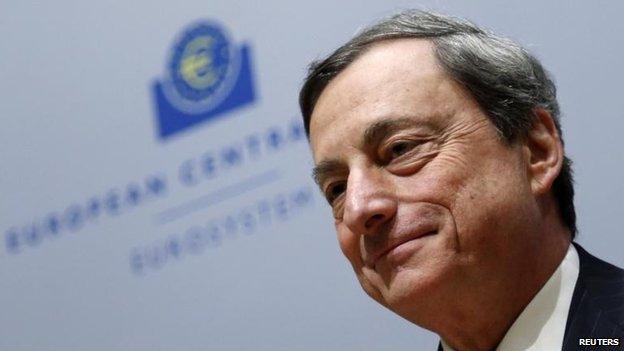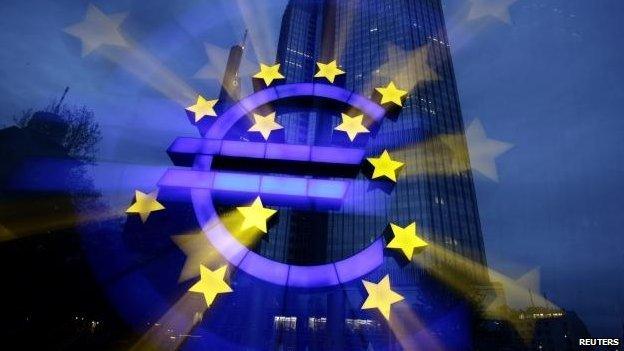ECB's credit and credibility test
- Published
- comments

ECB head Mario Draghi has hinted the bank will take action this week
A good deal is at stake for the European Central Bank (ECB) and the eurozone on Thursday, when the ECB announces what it will do to ward off the threat of deflation and help revive the large stagnating parts of euro area.
Not least at risk is the reputation of the ECB's charismatic president, Mario Draghi, who just under a month ago said that he and his colleagues on the ECB's governing council were "comfortable with acting next time".
Well "next time" is three days away. And if the ECB were to announce no monetary stimulus, or a package regarded as a damp squib, Mr Draghi's authority would be seen to be impaired.
Apart from anything else, I have rarely if ever come across greater confidence among investment bankers and the media about what a major central bank would do: the era of central banking mystery, at least in the case of the ECB, seems well and truly over.
Unless of course there has been a spectacular mismanagement of market expectations - in which case the consequences for the ECB's credibility would be pretty close to catastrophic.
So what are the bankers' and hacks' expectations for what the ECB will do, to lift eurozone inflation closer to the 2% target (it is currently 0.7%) and end the stagnation in countries as large as France and Italy?
Well perhaps the most eye-catching anticipated initiative would be to charge banks a negative interest rate for putting their spare cash on deposit at the ECB.
This would be the first time one of the world's most important central banks had charged a negative interest rate on bank deposits.
The point would be to discourage banks from sitting on their cash, and therefore spur them (in theory) to lend more of it to households and businesses.
And there would be a simultaneous cut, to a whisker above zero, at the rate at which banks can borrow from the ECB, the so-called refinancing rate.

The ECB is expected to announce a number of measures
I suppose the important thing to say about all this is that even at the height of the recent recession, neither the US Federal Reserve or the Bank of England levied an explicit tariff on cash they received from banks (although there was an implicit inflationary tariff).
So it rather shows the pretty pickle that the near flatlining eurozone still finds itself in.
But what is striking is that this adventure in negative interest rates is not regarded as adequate to revive the euro area.
Another exceptional monetary stimulus measure is anticipated, to solve the serious difficulty smaller businesses have been encountering in obtaining credit.
Again there is pretty much a banking and media consensus that what will be announced will be similar to the UK's so-called Funding for Lending scheme, viz longer term cheap loans to be provided to banks on the condition they then channel the low-cost credit to businesses.
This would be a new incarnation of the ECB's LTRO scheme - which was a cruder credit-creation initiative to prevent eurozone banks from falling over more than two years ago, when they were unable to borrow adequate amounts on markets.
Strikingly what is less clear is whether the ECB will follow through on its recent analysis that the eurozone economy is too dependent on loans provided - or rather not adequately provided - by banks.
Both the ECB and the Bank of England have recently signalled that they would like to see European financial markets evolving to become more like America's, where a majority of loans come from investors rather than banks (albeit housing finance in the US is implicitly underwritten by government).
The ECB could encourage this evolution, such that more European business and household loans would be packaged up into bonds, for sale to investors, by offering to buy such loans.
Were it to indulge in this version of what's known as quantitative easing - QE that involves buying private-sector credit, not government bonds, as with the Bank of England's scheme - there could be short-term and long-term benefits.
There could be an immediate (probably small) cut in the price of credit, and the stultifying influence of Europe's bloated banks might be reduced.
But there are serious technical difficulties in devising such a scheme. And it would involve the central bank taking credit risks that would make some eurozone members - most notably the Germans - less than comfortable.
So we may not see this very eurozone version of quantitative easing quite yet.